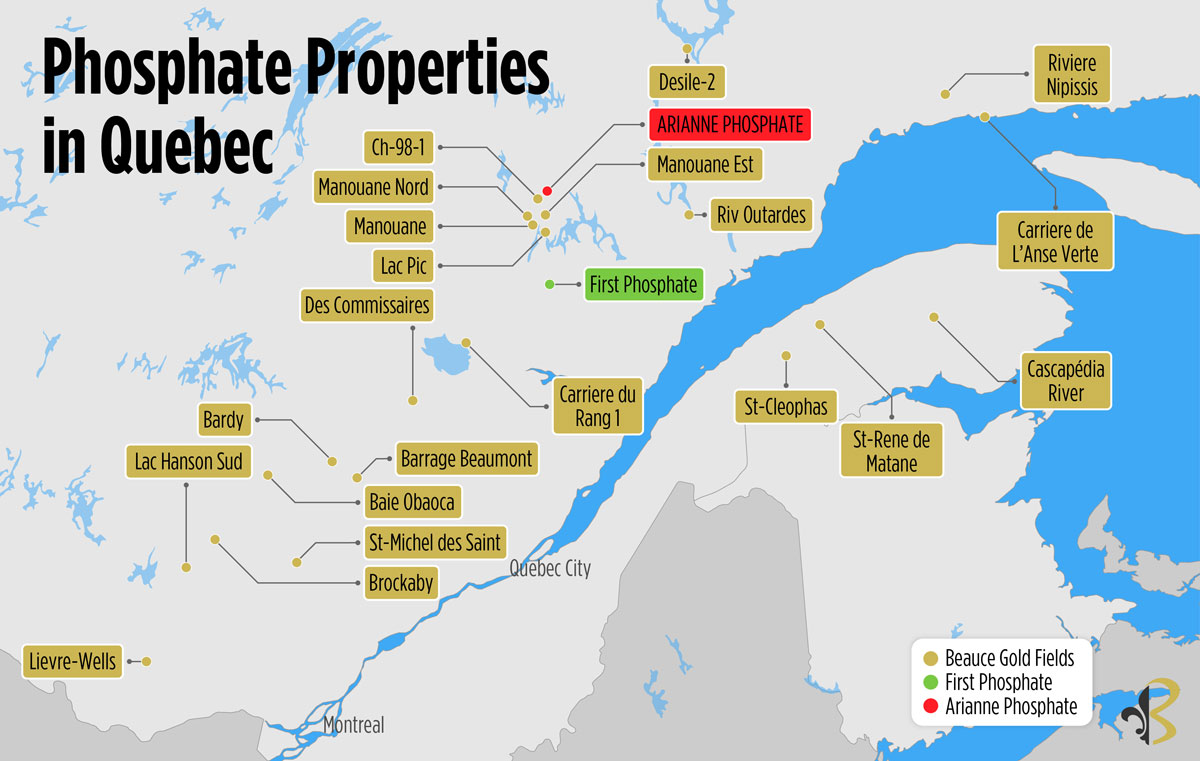Montreal, Quebec — Beauce Gold Fields (Champs D’Or en Beauce) (TSXV: ¨BGF¨), (“BGF”): (“BGF” or the “Company”): is pleased to announce it has acquired, through map staking, 21 prospective phosphates (P2O5) properties throughout Quebec. Phosphate is used in agriculture and is also a key component in producing lithium iron phosphate (LFP) batteries, which are increasingly used in electric vehicles.
Patrick Levasseur, President and CEO of Beauce Gold Fields, said, “The use of phosphate in LFP batteries creates a new demand for this critical resource, which could exacerbate the issue of Peak Phosphate.” Mr. Levasseur further stated, “Quebec’s geology holds a high potential for new phosphate discoveries.”

The 21 acquired projects are strategically located and are geologically prospective.
The properties were staked throughout southern Quebec and comprised 300 claims totalling 19,935 hectares that are 100% owned and royalty-free. The Company’s selection criteria were to stake properties that held historical phosphate (P2O4) occurrences or sample data and are accessible for exploration.
Data was sourced from Quebec’s Ministère des Ressources Naturelles (MERN), Système d’information géominière du Québec (SIGEOM) and the Géofiche databases.
The Company will continue with data analysis to rank the proprieties for their P2O5 potential. Properties deemed to have the highest potential will be prioritized for on-site exploration and outcrop sampling. This will be done concurrently with the Company’s gold projects.
|
Property |
Region |
Host Rock |
Mineral |
P2O5 Grade* |
|
Riv. Cascapédia |
Gaspésie |
Mudstone |
Phosphate |
14% |
|
St-Cléophas |
Gaspésie |
Phosphorite |
Phosphate |
|
|
St-René de Matane |
Gaspésie |
Schiste |
Phosphate |
12% |
|
Manouane Est |
Lac Saint-Jean |
Anorthosite |
Phosphate |
|
|
Manouane Nord |
Lac Saint-Jean |
Anorthosite |
Phosphate |
|
|
Manouane |
Lac Saint-Jean |
Anorthosite |
Phosphate |
|
|
Lac Pic |
Lac Saint-Jean |
Anorthosite |
Phosphate |
|
|
CH-98-0 |
Lac Saint-Jean |
Leuconorite |
Phosphate |
8.59% |
|
Des Commissaires |
Lac Saint-Jean |
Anorthosite |
Phosphate-Titanium |
6.94% |
|
Carriere du Rang 1 |
Lac Saint-Jean |
Gabbronorite |
Phosphate |
|
|
Riv. aux Outardes |
Baie Comeau |
Nelsonite |
Phosphate |
10.7% |
|
St-Michel-des-Saint |
Mauricie |
Gneiss |
Phosphate-Titanium |
2.89% |
|
Riv. au Lievre-Well |
Laurentide |
Pegmatite |
Phosphate |
|
|
Lac Hanson-Sud |
Laurentide |
Pegmatite |
Phosphate |
|
|
Brockaby |
Mont-Laurier |
Marbre |
Lithium-Phosphate |
|
|
Bardy |
La Tuque |
Gaboronorite |
Phosphate |
|
|
Barrage Beaumont |
La Tuque |
Granite |
Lithium-Phosphate |
|
|
Baie-Obaoca |
Lanaudiere |
Syenite |
Phosphate |
4% |
|
Desile-2 |
Manicouagan |
Gaboronorite |
Phosphate-Titanium |
4.95% |
|
Car. de L’Anse Verte |
Côte Nord |
Anorthosite |
Phosphate |
|
|
Riviere Nipissis |
Côte Nord |
Gabbro |
Phosphate |
|
*Highest historical grade sampled
Even though the data was sourced from Quebec’s MRN databases, the Company cautions investors to note that historical phosphate P2O5 samples results, grades, mineralization and property descriptions are conceptual in nature. A qualified person has not completed sufficient work to validate historical data nor to classify mineral resources as defined by National Instrument (NI) 43-101; it is uncertain if future exploration will result in any delineated mineral resources.
About phosphate
Phosphate is a critical nutrient for plant growth and plays a crucial role in agriculture. It is commonly used in the form of fertilizers to enhance crop yields. However, the global demand for phosphate is increasing rapidly due to population growth and dietary changes, which could lead to a depletion of global phosphate reserves in the near future, also known as “Peak Phosphate.”1
In addition to its use in agriculture, phosphate is also a key component in the production of lithium iron phosphate (LFP) batteries, which are increasingly being used in electric vehicles (EVs) due to their high energy density and safety features. The LFP battery market is projected to grow significantly in the coming years, driven by the global push towards EVs. Tesla, Renault, Volkswagen, Ford are just a few examples electric vehicle (EV) car companies currently using lithium iron phosphate (LFP) batteries in their vehicles.
The use of phosphate in LFP batteries creates new demand for this critical resource, which could exacerbate the issue of Peak Phosphate. Hence the importance of exploring for new phosphate reserves.
Jean Bernard, B,Sc. Geo., is a qualified person, as defined by NI 43-101, who has reviewed and approved the technical information presented in this release.

Beauce Gold Fields is a gold exploration company focused on placer to hard rock exploration in the Beauce region of Southern Quebec.
